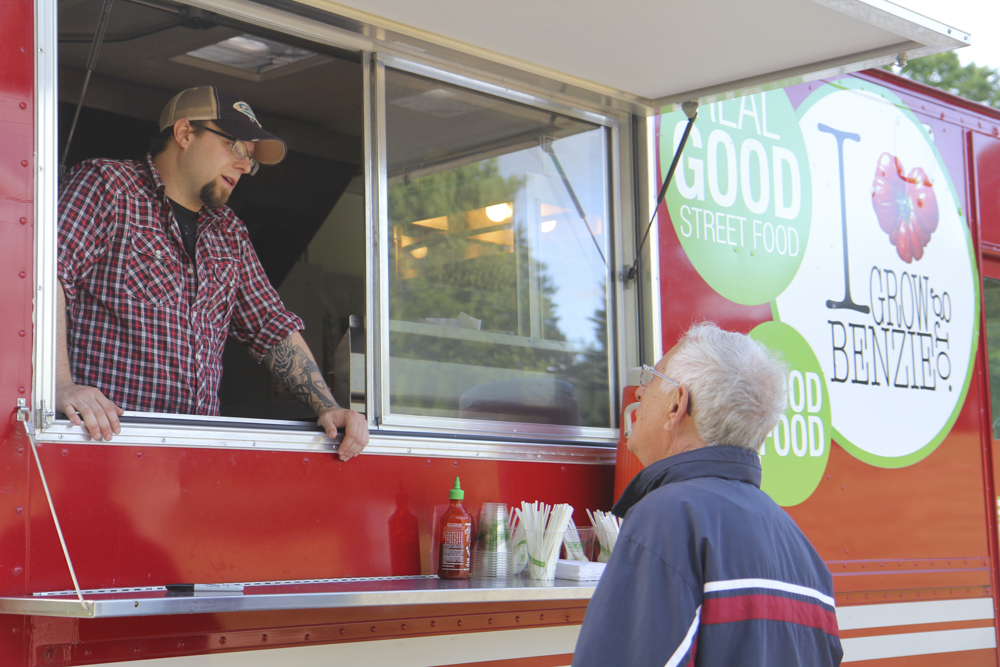Elberta Farmers’ Market welcomes Grow Benzie
By Jacob Wheeler
Current Editor
The gourmet food truck craze has brought diverse culinary options with a low-carbon footprint to city streets and public parks nationwide over the past decade—to the delight of millennials, hipsters, and tourists, as well as working Americans who no longer have the time to drive home for a relaxing lunch hour. Food trucks have surged in the age of Facebook, the DIY career, and the frenetic pace that now defines life in 21st-century America.
Food trucks have also arrived in Benzie County, but forget about 15-minute lunch breaks or hustling for an $8 taco between business calls. Here in our woods, the laidback summertime ritual still resembles a meandering creek.
Over the winter, there was lots of discussion in Benzie about whether food trucks should be allowed, and if so, where they should be allowed and when. Deliberations are ongoing. Mobile vending has been tried here before.
Food trucks may never become as a big of a hit in this county as they are in nearby Traverse City, but a spark has definitely been lit, and they may yet catch on.
Up For Discussion
In Elberta, the village council—under advisement from the Parks & Recreation Commission—decided in March to allow food trucks this summer on a trial basis during the Thursday farmers’ market.
“Everyone who has approved of this concept at the farmers’ market thinks this will be great for the community at large,” says Sue Oseland, who runs the Elberta Farmers’ Market. “We can expand the market by having people who wouldn’t otherwise visit the market come and get good, local food. I think everyone will think, ‘This is cool.’”
Some officials are downright enthusiastic about the potential of food trucks in their municipality.
“I think I can speak for the commission when I say that we were all immediately excited by the idea of opening the farmers’ market up to food trucks this year,” says Emily Votruba, secretary of the Elberta Parks & Recreation Commission. “It was fun to discuss the logistics and to think about how food trucks will not only go along with but advance our market’s mission, which is to provide high-quality, locally produced food to our community and to create a healthy, welcoming, and profitable venue for local producers.”
Votruba added that this will be a trial basis for the Elberta program, which could potentially be expanded to more hours or locations in the future.
“We’ll learn a lot and see if we want to do it again next year,” she says. “It’s a really fantastic time to live and volunteer here in the village with so many visionaries like Sue around making cool new things happen!”
Meanwhile, in Frankfort, a subcommittee of the Downtown Development Authority (DDA) took on a lengthy process of facilitating conversations between the business community and the public back in February and March.
Ultimately, the DDA recommended that Frankfort’s food truck ordinance remain mostly the same. Mobile vending, which includes food vendors and non-food vendors, is currently—and has been for more than two decades—permitted on private commercial property for a fee of $50 per day. The subcommittee recommended that the City of Frankfort revisit this fee structure, potentially adding a seasonal rate that would give the vendor the security to make a commitment to a particular location all season long.
For instance, Traverse City’s seasonal rate on private commercial property is $725, which is based on the taxes that brick-and-mortar businesses pay. There have been two mobile vending seasonal fees that have been individually approved by Frankfort’s city council, however no formal seasonal fee structure has been approved.
“As of now, anyone who wants a seasonal fee has to negotiate it directly with city council,” says Josh Mills, city superintendent for Frankfort.
The DDA recommended another change to the ordinance that would allow vendors at the Saturday farmers’ market to cook and sell the food that they grow. The city allowed the policy change this spring, and Bud Phillips is already taking advantage of this change. His business, Bud’s Pure Maple, features cotton candy and other delights, made from his own maple syrup. Ricky Hilliard of Frog Hollow Farms in Kaleva also wants to start a new side businesses, called Ricky’s Twisted Veggies, through which he will sell fried potatoes, but he will have to wait until fall when his crop comes in. There is talk of another local business, Peninsula Pops, which would run a popsicle stand with icy delights that are made in the Grow Benzie kitchens. For the last few years, kettle corn has also been made and sold at the market.
Additionally, the city approved non-profit food trucks—such as those from Grow Benzie, the Lions Club, Rotary—to be allowed in public spaces on special events.
Lastly, the DDA subcommittee also discussed two items related to Frankfort’s brick-and-mortar businesses, though these agenda items have not yet been addressed by the city commission. The subcommittee recommended that the city permit existing restaurants to deliver food on public property, and they mentioned in their report that Frankfort is considering a portable facility for renting water-sports items at the Lake Michigan beach. First priority would be given to current existing Frankfort businesses, such as Beach Nut Surf Shop and Crystal Lake Adventure Sports.
Frankz, a hot dog restaurant in downtown Frankfort, is the first brick-and-mortar to offer a “beach menu” that is specifically targeted at delivery: on Fridays, Saturdays, and Sundays, you can call in your order from a limited list of items, and Joey Barcheski’s employees will ride their bikes down to meet you at the beach turn-around.
A History of Mobile Vending
Mobile vending is nothing new in Frankfort, which has seen many come and go over the years.
For instance, back in the 1990s, there was Dog Haus, a hot dog wagon that set up in the space that is currently occupied by Stormcloud Brewing Company. Dog Haus later moved to the Smokestack, which later became what is now known as Gateway Village.
Wingz & Thingz is a popular food truck in Northern Michigan and a frequent caterer for big concerts. The truck set up in the parking lot of Big Bob’s Up North Outfitters last spring, but left for Traverse City before the busy summer season began. The owner and the city negotiated a seasonal fee of $250 per month for half of May and all of June. Amanda Rommell, co-owner of Big Bob’s, says that they did not charge the truck an additional fee to set up in their lot, but the truck’s owner did throw in a little to pay for the electricity that he was using.
“We were doing him a favor until he got rolling,” Rommell says of the Monday-through-Wednesday operation. She concedes that those hours are not super conducive for foot traffic on the east side of town during early spring, and she thinks that he would have done quite well if he had stuck around for the busier season.
In 2014, Fox & Fawn Vintage—an eclectic boutique of vintage home goods, furniture, and clothing for sale out of a shiny 1969 Airstream trailer—set up in the parking lot of Bayside Printing on a couple of occasions. Aubrey Ann Parker, owner of the shop, says that the $50 daily fee was prohibitively expensive, so she negotiated a rate of $725 for the season with city council. (Ultimately though, Parker was not able to take advantage of this, as family members had moved into the camper for the remainder of the summer.)
Also in 2014, Eric Haan set up a hot dog stand in the parking lot of the Frankfort Laundromat, owned by Eric’s father, Dick Haan. This was part of the overall business plan of the property, according to Mills, so the city did not impose a $50 daily fee.
“Basically this was the property owner being creative and taking advantage of business opportunities on his own property,” Mills explains. “We encourage mixed uses like this one. It would be great to see more.”
Meanwhile, Crystal Lake Adventure Sports, with a home base out of Beulah, has—for more than a decade—had a nonpermanent structure at the American Legion Hall for renting water-sports equipment near the Frankfort beach.
Crystal Lake Adventure Sports pays the American Legion a seasonal fee for their little rental shed. When this agreement first started, the city council waved the $50-per-day fee so that all of the money collected could instead go to the American Legion. As a nonprofit organization, the Legion is able to use those dollars to give back to the community in the form of college scholarships.
“Crystal Lake Adventure Sports will be ‘grandfathered’ with this arrangement, but any new request for outdoor activity will be assessed a city fee that will be either $50 per day or approved by the city council,” says Mills, who notes that Serkan Erginkara’s Frankfort Takeout did not pay a $50 daily fee back in 2014, because it was located inside the Legion hall and thus not a deemed “mobile” vendor. (Click here to read our story about Erginkara’s Turkish take-out, now closed, in our archives.)
New Guys Around Town
Look for Josh Herren’s new “Tiki-licious” grill-and-party cart this summer in downtown Frankfort; he will also rent the cart out for parties, and you can hire him to run it. More than two decades ago, Herren started washing dishes at Harbor Shores and has since worked his way up the food-industry ladder at local favorites like Dinghy’s, Crystal Mountain’s Main Street Grill, the Frankfort Deli, Coho, Northern Naturals, Frankfort Takeout, and The Cabbage Shed. Herren’s latest venture is a Tiki-inspired food cart, equipped to grill kabobs, meats, and whatever your palette craves. Check out the Tiki cart online to find out where Herren is slinging kabobs today or how you can book him for your next backyard barbeque: Facebook.com/Tikilicious1.
Meanwhile, Mary’s Asian Cuisine—a bright yellow food truck—is once again parked on the site of the former Beulah Oil Company, between the Market Basket and Eden Brook Place, the former Brookside Inn. This is the food truck’s second season serving Asian fusion, fast food, and culturally diverse street food in Beulah. Mary Remey, a native of the Philippines who went to culinary school in Singapore, met and married Jim, a Benzie Central graduate, 11 years ago. She is the daughter of a chef, and her Asian cuisine, composed of all fresh ingredients, is a true fusion of Malay, Thai, and other delectable ethnic fares. Mary’s is open seven days a week from 11:30 a.m. to 7 p.m. until the end of October. Her most popular items are the spring rolls (four for $5) and the sesame chicken with bacon-fried rice (a basket costs $8). She will also be selling the spring rolls at the Market Basket and other local restaurants after she closes for the winter. Check out more details here: bit.ly/28Lb1AZ.
Another new venture is Grill Benzie, a food truck operated by the local food and farming nonprofit Grow Benzie. The truck will be serving food every Monday afternoon from 3-7 p.m. during the Grow Benzie Farmers’ Market at 5885 Frankfort Highway (M-115); that same food truck will appear at the Elberta Farmers’ Market on Thursday mornings from 8 a.m. to 12:30 p.m. According to Josh Stoltz, Grow Benzie’s executive director, the food truck will be making regular appearances at St. Ambrose Cellars of Beulah and the soon-to-be-open Iron Fish Distillery of Thompsonville. Grill Benzie is also booked for several local events and festivals—including Grow Benzie’s eighth annual Midsummer Night’s Garden Party on Tuesday, July 12, and second annual Bayou on the Bay on Saturday, August 13—but still has open dates available, in case the public wants to hire it for private events.
“Part of our mission is to increase access to healthful foods, jobs, life skills, and each other, so a food truck is a grand slam for Grow Benzie,” Stoltz says. “Our board had discussed ways to get what we grow here onto plates—including a food truck or a pop-up cafe in our kitchen—so when Brandon Seng from Goodwill offered a partnership through the MI Fresh Start job-training program, we jumped at the opportunity. Goodwill is training life and job skills to our newly hired employees, and Grow Benzie is connecting folks to tasty, healthy food—all from a giant, fire-engine-red food truck that people gravitate to because food trucks are cool.”
The food truck’s menu will change throughout the growing season but, according to Stoltz, will always feature local ingredients, either that which is purchased from vendors at farmers’ markets or that which is grown in Grow Benzie’s own gardens. The Grand Traverse Regional Land Conservancy recently donated 340 pounds of locally raised, grass-fed beef from Misty Acres Farms, a 600-acre preserved property that straddles the Benzie-Manistee county line. Much of this will find its way into tacos, pasties, kabobs, and sandwiches made by Grow Benzie and sold at the food truck. Delicious vegetarian options will be available, too.
Stoltz hopes to showcase products made in Grow Benzie’s incubator kitchen, including Granola Empire and Peninsula Pops frozen fruit bars.
“This is the same food that we grew while teaching people how to grow it for themselves and that we use for teaching classes on how to prepare and preserve in our commercial kitchen,” Stoltz adds.
Nourishment is one goal of Grow Benzie’s food truck; multimedia education is another.
“As a nonprofit, Grow Benzie is all about education and outreach, especially since we’ll have such a large audience this summer,” Stoltz says. “So we’ll be live-streaming demonstrations on Facebook and YouTube from inside the truck and also looping informational videos on a giant HDTV outside of the truck while people are waiting for their food. People love to learn about their food, so we’re going to have some fun showing them where it’s from and how we’re preparing it.”
The Elberta Farmers’ Market will also feature demos and prepared food for sale from Jim Barnes’s nearby Elberto’s Taqueria. Sue Oseland, who runs the Elberta Farmers’ Market, is thrilled to welcome Grill Benzie and Elberto’s, and she hopes, in the future, to see food trucks that introduce Indian and other ethnic foods, not otherwise common in Northern Michigan.
“This should benefit all of us by bringing more people into town,” Oseland says. “After they eat at a food truck, they’ll stay and go to the local brewery or go shopping. They’ll bike the trail, or kayak, or go to beach.”
Photo captions: The Grill Benzie food truck will be serving up breakfast fare on Thursday mornings at the Elberta Farmers’ Market. Photo by Aubrey Ann Parker.




